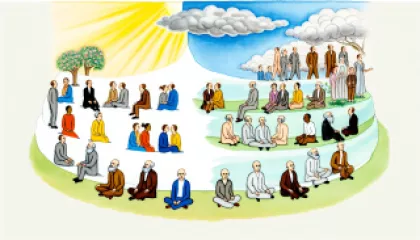Deciphering Our Emotional Weather: A Perspective on Understanding Moods
Our emotions are as unpredictable as the weather. They can shift from tranquil calm to turbulent storm in an instant, like a sudden downpour on a sunny afternoon. We are all subject to our emotional weather patterns, and understanding these patterns is the key to navigating our internal landscapes with grace and resilience.
Emotions as Weather
Before we delve into the intricacies of understanding moods, it's important to establish a fundamental analogy: emotions as weather. Why is this analogy apt? Emotions, much like weather, are transient. They come and go, change unpredictably and are never static. They are also impartial - they don't discriminate in their occurrence, affecting everyone regardless of age, gender, socio-economic status or ethnicity. To understand our moods, we need to first appreciate this ebb and flow, accepting that emotions are not something to control, but rather observe, understand, and navigate.
The Components of Our Emotional Weather
Just as weather has multiple components like temperature, precipitation, wind speed, and atmospheric pressure, our emotional weather is also composed of various elements. The basic emotions - happiness, sadness, fear, anger, surprise, and disgust - act like the primary colors of our emotional palette. Our moods are often complex blends of these basic hues, creating a spectrum of feelings ranging from contentment to despair.
Happiness and Sadness
Happiness is like sunshine, brightening our inner world, while sadness mimics the gloom of an overcast day. However, it is important to note that both are essential. Just as plants require both sunlight and rain to grow, our emotional health requires a balance of happiness and sadness. It's unrealistic and unhealthy to aspire to a perpetually sunny internal climate. Rainy days are necessary, allowing for introspection and growth.
Fear and Anger
Fear is akin to a thunderstorm, stirring up anxiety and unrest. It often signals danger, much like storm warnings prompt us to take shelter. Anger, on the other hand, resembles a wild fire, burning with intensity and capable of causing destruction if not managed properly. However, it can also serve as a catalyst for change, sparking action where there was previously stagnation.
Surprise and Disgust
Surprise mirrors a sudden weather change, catching us off guard and triggering a range of reactions. It may be a welcome respite or an unwelcome disruption, depending on the context. Disgust is like a toxic smog, a reaction to something offensive or repellent in our environment.
Understanding Our Emotional Climate
While weather is a short-term phenomenon, climate refers to the long-term patterns. Similarly, our emotional climate is the general mood that characterizes our life over long periods. Some people have a predominantly sunny disposition, while others might have a more cloudy emotional climate. Understanding our emotional climate can help us identify patterns, triggers, and coping mechanisms, leading to improved emotional health.
Identifying Patterns
Just as meteorologists study weather patterns to predict future conditions, we can observe our emotional patterns to better anticipate and manage our moods. By regularly checking in with ourselves and tracking our feelings, we can start to notice recurring themes and patterns. This self-awareness can provide valuable insights into our emotional wellbeing.
Recognizing Triggers
Weather changes are often triggered by specific environmental factors. Similarly, our moods can be influenced by various factors in our environment - a stressful day at work, a conflict with a loved one, or even lack of sleep can trigger emotional shifts. Recognizing these triggers is crucial to managing our emotional weather effectively.
Developing Coping Mechanisms
Just as we take measures to protect ourselves from adverse weather conditions, we can develop coping mechanisms to navigate our emotional storms. This could be anything from practicing mindfulness to seeking support from loved ones or professionals. The key is to cultivate a toolkit of strategies that work best for you.
In Conclusion: Embracing Our Emotional Weather
In conclusion, understanding our moods is a journey of self-discovery and acceptance. It's about embracing the full spectrum of our emotional weather, from the sunniest days to the stormiest nights. It's about realizing that it's okay to not feel okay sometimes and that every mood, like weather, is temporary. With this understanding, we can navigate our emotional landscapes with greater ease and resilience, fostering a healthier relationship with ourselves.
Remember, without weather, our world would be a barren, lifeless place. In the same way, without emotions, we would be devoid of the experiences that shape us, guide us, and ultimately, make us human. So, let's embrace our emotional weather in all its unpredictability and beauty, for it adds color, depth, and richness to the tapestry of our lives.








